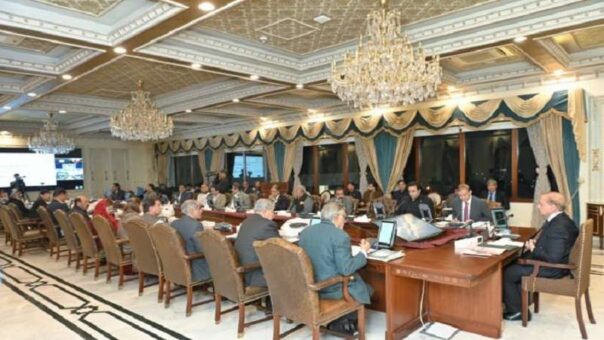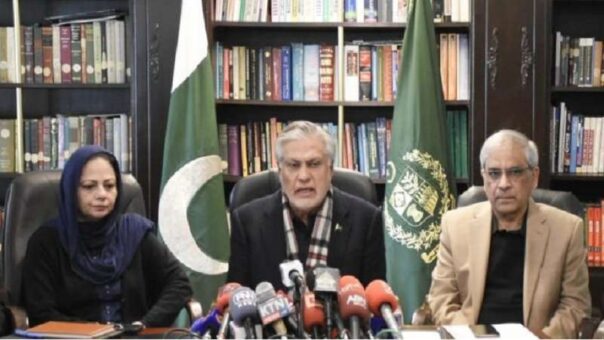ISLAMABAD: Pakistan on Wednesday presented a mini budget at the National Assembly in order to comply with the conditions of International Monetary Fund (IMF).
(more…)Tag: mini budget
-

Cabinet okays Finance Supplementary Bill 2023; sales tax rate goes up to 18 per cent
ISLAMABAD: The federal cabinet on Tuesday approved the Finance Supplementary Bill 2023 allowing increase in general sales tax to 18 per cent and additional taxes on luxury items as part of the reforms related to the International Monetary Fund’s Ninth Review.
(more…) -

Mini budget to be presented before parliament today
In order to comply with IMF conditions, Pakistan government will present a supplementary finance bill or mini budget before the parliament (today) on February 15, 2023 for the approval.
(more…) -

Pakistan set to announce mini budget; sales tax rate may rise to 18pc
Pakistan is gearing up to announce a mini budget that aims to generate an additional Rs200 billion in revenue.
(more…) -

Mini budget to be presented before parliament for approval: Dar
ISLAMABAD: The government will present a mini budget in coming days before the parliament for approval to comply with generating additional tax revenue.
(more…) -

New rates of FED on local, imported motor vehicles
ISLAMABAD: The federal government has proposed enhancement in federal excise duty (FED) on imported and locally assembled vehicles through mini-budget.
The government on December 30, 2021 presented Finance (Supplementary) Bill, 2021 to take tax measures to generate additional revenue for improve fiscal situation of the country. One of the major revenue measure is increasing the FED on imported and locally manufactured motor vehicles.
READ MORE: Mini-budget: FBR to generate Rs4.5bn through tax rate increase on cellular services
Sources said that the Federal Board of Revenue (FBR) had estimated to generate additional Rs6.5 billion through the changes.
According to the changes proposed, the FED on imported completely built unit (CBU) up to 1,000 CC the rate shall be unchanged at 2.5 per cent ad valorem.
READ MORE: Mini-budget: income tax rates proposed for foreign TV dramas
However, CBU imported vehicles between 1001CC to 1799CC the FED has been proposed to enhance to 10 per cent from 5 per cent.
Similarly, the CBU imported motor vehicles between 1800CC to 3000CC the FED has been increased to 30 per cent from 25 per cent.
Likewise, the motor vehicles above 3000CC, the FED has been enhanced to 40 per cent from 30 per cent.
READ MORE: Tax exemptions worth Rs343 billion withdrawn through mini-budget
The FED on locally manufactured motor vehicles has been kept unchanged at zero per cent for engine capacity up to 1000CC.
However, motor vehicles with engine capacity between 1000CC to 2000CC and exceeding 2000CC, the FED has been enhanced to 5 per cent from 2.5 per cent and enhanced to 10 per cent from 5 per cent, respectively.
The Federal Board of Revenue (FBR) said that the FED has been announced to increase to 30 per cent from existing rate of 25 per cent on import of double cabin (4X4) pick-up vehicles.
Similarly, the FED on locally manufactured double cabin (4X4) has been increased to 10 per cent from existing rate of 7.5 per cent.
READ MORE: Mini-budget: Advance tax on motor vehicles doubles
-

Salt producers flay tax withdrawal through mini-budget
KARACHI: Ismail Suttar, Chairman, Salt Manufacturers Association of Pakistan (SMAP) has urged the government not to levy taxes on Iodized salt through mini-budget as the Covid-19 pandemic has already hit the salt export market badly due to rising freight costs and supply chain disruptions.
READ MORE: Mini-budget: FBR to generate Rs4.5bn through tax rate increase on cellular services
In a statement, he said: “If the government withdraws the exemption from Iodized salt, then it will create a huge impact on the cost of living of a common man as salt is the most essential ingredient in every single food item that a human consumes”.
SMAP Chairman further said that Salt is not only an essential food ingredient but has numerous health benefits especially the Iodized salt which creates hormones to regulate heart rate and blood pressure as well as burns extra fat deposits leading to heart diseases.
READ MORE: Mini-budget: income tax rates proposed for foreign TV dramas
“Previous governments have always promoted the use of Iodine in salt keeping in view the health of our children who are already suffering from stunted growth and obesity”, he said, adding that this ruthless decision to impose sales tax on such an essential item is beyond understanding and it only shows that the government seems to have no clue of its actions and is ready to meet the revenue targets even if it must compromise the common man’s health.
-

Mini-budget implemented through presidential ordinance
ISLAMABAD: The government on Wednesday implemented a mini budget through a presidential ordinance making amendments to all duty and tax statutes.
The amendments to tax laws namely ‘Tax Laws (Second Amendment) Ordinance, 2019’ have been promulgated through the presidential order.
The consultants at Tax Excellence called it mini-budget and highlighted major changes made to Income Tax Ordinance, 2001, Sales Tax Act, 1990, Customs Act, 1969 and Federal Excise Act, 2005.
Now, the Tax Laws (Second) Amendment Ordinance, 2019 has been promulgated on December 26, 2019, which will remain valid for four months, unless extended or approved by the National Assembly.
The ordinance contains several amendments following Sections:
Sales Tax Act, 1990
Section 2(12A): Greenfield Industry
Section 2(43A): Tier-1 Retailer
Section 33: Offences and penalties
Section 40D: Provisions relating to goods supplied from tax-exempt areas
Section 73: Certain transactions not admissible
Section 76: Fee and service charges
Sixth Schedule: Table-1 (Imports or Supplies) [Exempt Supplies]
Eighth Schedule: Table-1 [Reduced Rate]
Ninth Schedule: Special provisions relating to traders [major change for traders]
Tenth Schedule: Rule for persons not appearing in Active Taxpayers list
12TH Schedule: Value-Addition Tax [major procedural changes]
Income Tax Ordinance, 2001
Section 2(27A): greenfield industrial undertaking [definition inserted-major impact & applicable from 1.7.19]
Section 130: Appellate Tribunal [major change]
Section 152: Payments to non-residents [major change]
Section 181D: Business licence scheme. [major change]
Section 214E: Closure of audit. [major change]
Section 216: Disclosure of information by a public servant
Section 222A: Fee and service charges
Section 230E: Directorate General of International Tax Operations [major change]
First Schedule: Part-I, II & III [major changes]
Second Schedule: Part-I, II, III & IV [major changes]
10TH Schedule: Rule 10 Clause (ba) inserted
Federal Excise Act, 2005
Section 49: Fee and service charges
Customs Act, 1969
Section 3CCA: Directorate General of Law and Prosecution” [newly inserted]
Section 6: Entrustment of functions of customs officers to certain other officers
Section 7: Assistance to the officers of customs.
Section 139: Declaration by passenger or crew of baggage
Section 156: Punishment for offences [major changes]
Section 164: Power to stop and search conveyances.
Section 169: Things seized how dealt with
Section 185A: Cognizance of offences by Special Judges
Section 194: Appellate Tribunal [section substituted]
Section 196: Reference to High Court
-

KCCI warns of mass unemployment, business closure on new mini budget
KARACHI: Karachi Chamber of Commerce and Industry (KCCI) has warned the government of mass unemployment and closure of business as a result of any move to introduce mini budget or imposing additional taxes to bridge the fiscal deficit.
In a statement on Friday, Acting President of KCCI Khurram Shahzad, while referring to various rumors and some media buzz going on about the announcement of yet another mini budget or imposition of additional taxes to overcome the yawning deficit, warned that any such move would prove ruinous for the economy as the industries and businesses, which were already underperforming due to imposition of exorbitant taxes in the budget for current fiscal year, will not be able to sustain the impact of more additional taxes.
Khurram Shahzad stated that the business & industrial community was not in a position to bear any more of such shocks which would lead to closure of many businesses and cause massive unemployment which was already on the rise therefore, the government must strictly refrain from such an anti-business and anti-industry move.
Referring to the forthcoming visit of the IMF team which is due after Aashura to discuss fiscal issues with special focus to restrict target of primary deficit within the desired limits, Khurram Shahzad pointed out that under IMF conditions, the primary deficit has to be brought down from 1.8 percent of GDP to 0.6 percent of GDP in the current fiscal year but, instead of declining, the deficit has gone all the way up to 3.6 percent.
“It means that the government will have to carry out massive adjustments of Rs1,300 billion to reduce primary deficit to 0.6 percent of GDP which many experts believe will be done through another mini budget in which more additional taxes are likely to be imposed but this unwise move would plunge the country into further economic crises and the economy may reach to a point of no return,” he added.
He said that Federal Board of Revenue (FBR), on one hand, has been claiming that the tax base has improved to 2.561 million taxpayers and the overall growth was also achieved while on the other, the State Bank of Pakistan (SBP) has forecasted further economic slowdown while the International Monetary Fund (IMF) has also expressed deep concerns over worsening fiscal front, creating a very confusing situation which was beyond business community’s understating. “We are totally confused about the ground realities as the statements given by FBR were contradicting what the State Bank and IMF have been forecasting”, he added.
Khurram Shahzad said that the business & industrial community fully respects and appreciates the vision, thinking and resolution of Prime Minister Imran Khan which would certainly transform Pakistan into the most flourishing economy of the region but in order to pull the economy out of crises, the decision makers will have rethink all the strategies and policies which have proved counterproductive so far and instead of showing any signs of improvement, these measures have actually broken the backbone of common man due to across-the-board inflation and also radically enhanced the cost of doing business, resulting in the overall depressed performance of almost all the businesses including Large Scale Manufacturing Units, SMEs and export oriented industries and other businesses.
“We, the business and industrial community of Karachi, are hoping that the PTI government would review all its existing policies and strategies which have failed miserably to provide any relief neither to the business & industrial community nor to common man and they come up with those practical steps in consultation with all the stakeholders which prove favorable for the economy, businesses and the common man,” he added.
-

Finance Minister Asad Umar Unveils Economic Reform Package to Boost Investment and Exports
On Wednesday, Finance Minister Asad Umar took the floor of the house to present a comprehensive economic reform package aimed at promoting investment and exports in Pakistan.
(more…)